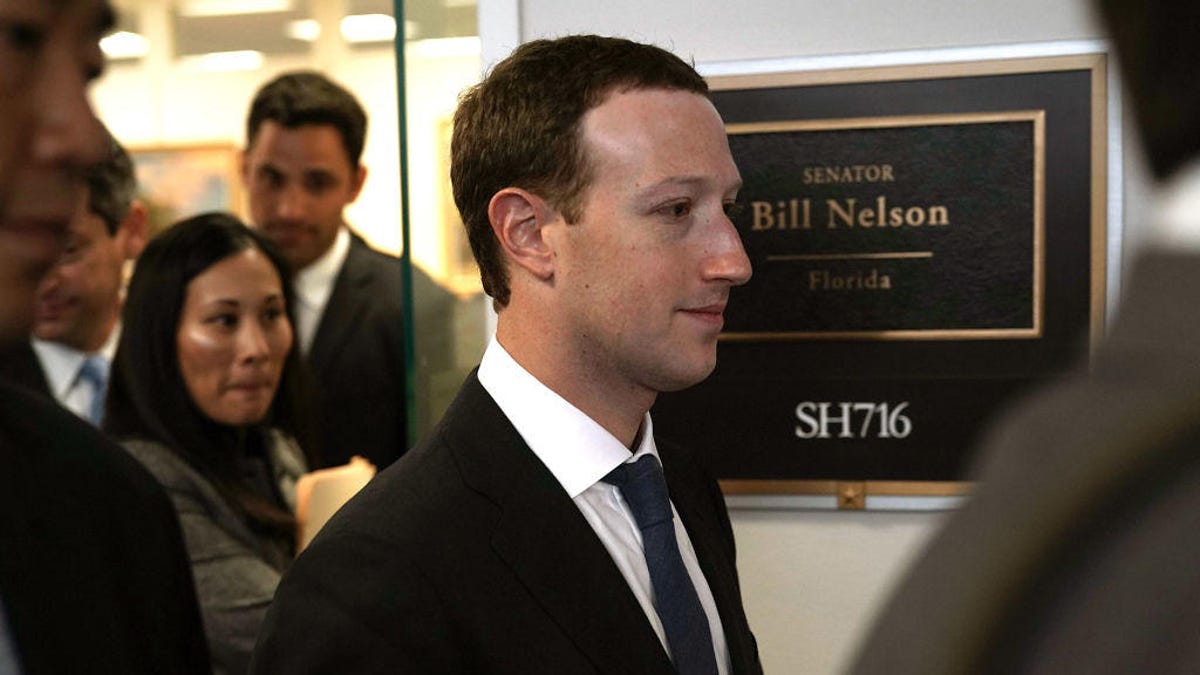5 notable themes from Mark Zuckerberg’s opening testimony
From new ways of protecting its users to the never-ending problem of security, here are the greatest hits from Zuck’s prepared remarks before Congress.

Facebook CEO Mark Zuckerberg is in Washington.
Facebook CEO Mark Zuckerberg is headed to Congress, but we already have a sneak peak at his opening testimony.
He's scheduled to appear at a joint hearing of the Senate Judiciary Committee and Senate Commerce Committee on Tuesday, and before the House Energy and Commerce Committee on Wednesday.
His testimony, released by Congress Monday, gives background on the Facebook scandal involving digital consultancy Cambridge Analytica, which accessed and may have improperly used the data of some 87 million Facebook users. It also covers territory relating to the social media platform's problems with Russians trying to meddle in the 2016 US election.
With issues like these, Congress has been eager to get Zuckerberg to Washington.
"We face a number of important issues around privacy, safety, and democracy, and you will rightfully have some hard questions for me to answer," the testimony reads.
Here are 5 notable themes from Zuckerberg's opening testimony.
Expect some new features
Aside from describing the events that have landed Zuckerberg in Washington to begin with, the testimony outlines plans for tools that will help you better understand the political ads you see. Facebook will label ads, and advertisers will be required to disclose who paid for those ads. We've already seen a flood of announcements from Facebook regarding our privacy, from clearer settings menus to a way to delete our third-party apps.
The testimony notes this practice is starting in the US and will be rolling out to the rest of the world in months to come. Facebook is also working on a tool that would let you see the ads a particular page is running. So far, the tool is being tested out in Canada before also being launched worldwide in the next few months. The testimony also mentioned a searchable archive of past political ads.
(Our colleagues at TechRepublic looked at how the Cambridge Analytica data scandal might affect advertisers using Facebook to reach customers. That story can be found here.)
Facebook is taking multiple approaches to limiting data access
Zuckerberg already has a list of tacts Facebook is taking in order to decrease the data accessible about you. For example, if you haven't used an app in three months, the developer loses access to your data. If you do approve an app to access your data, it will only receive your picture, email address and name. Facebook also wants to rein in the ways someone could get to your friends' data by restricting APIs for groups and events. What's more, you can no longer look someone up by their email or phone number as Facebook found the feature was being abused.
You have control, too
In addition to the ways in which Facebook will try and tighten access to your data, the platform will also make it easier for you to manage that access. "This week we started showing everyone a list of the apps you've used and an easy way to revoke their permissions to your data," the testimony said. It's not a new feature, but as the testimony notes, it's nested in your privacy settings— now you can expect to see it at the top of your News Feed.
There could be more to come
Facebook has explained that it made changes to the platform as of 2014 that would prevent a situation similar to the Cambridge Analytica issue at the present time. However, there were apps that had access to "large amounts of information" prior to 2014. Facebook is investigating those and if anything suspicious pops up, there will be a full forensic audit. "If we find that someone is improperly using data, we'll ban them and tell everyone affected," the testimony said.
Zuckerberg says security is a problem we'll never totally solve
Toward the end of Zuckerberg's testimony, he reminds that for all the approaches Facebook is planning to take, nothing will ever be completely secure. "Organizations like the [Internet Research Agency] are sophisticated adversaries who are constantly evolving, but we'll keep improving our techniques to stay ahead," the testimony said.
First published April 9, 12:31 p.m. PT
Update, April 10 at 11:23 a.m.: Adds livestream of Zuckerberg's testimony.

